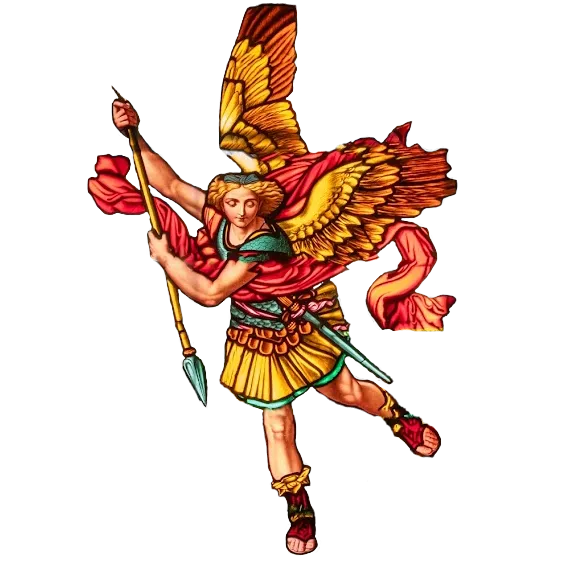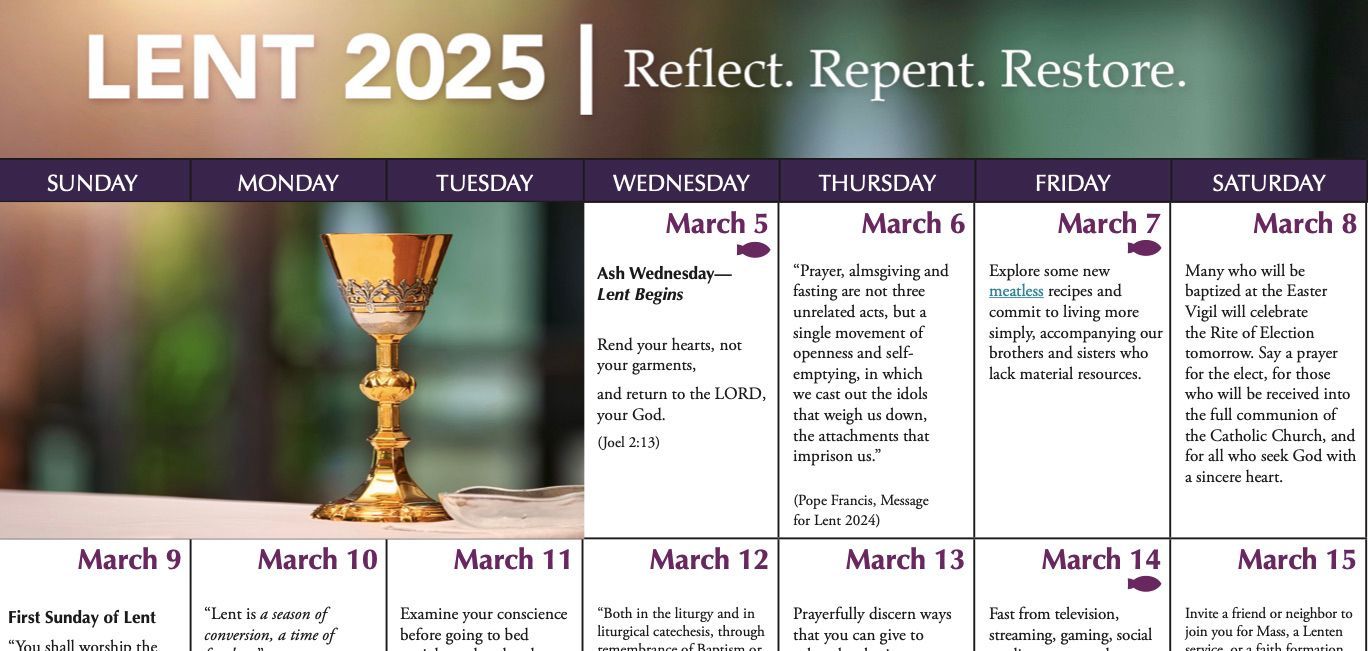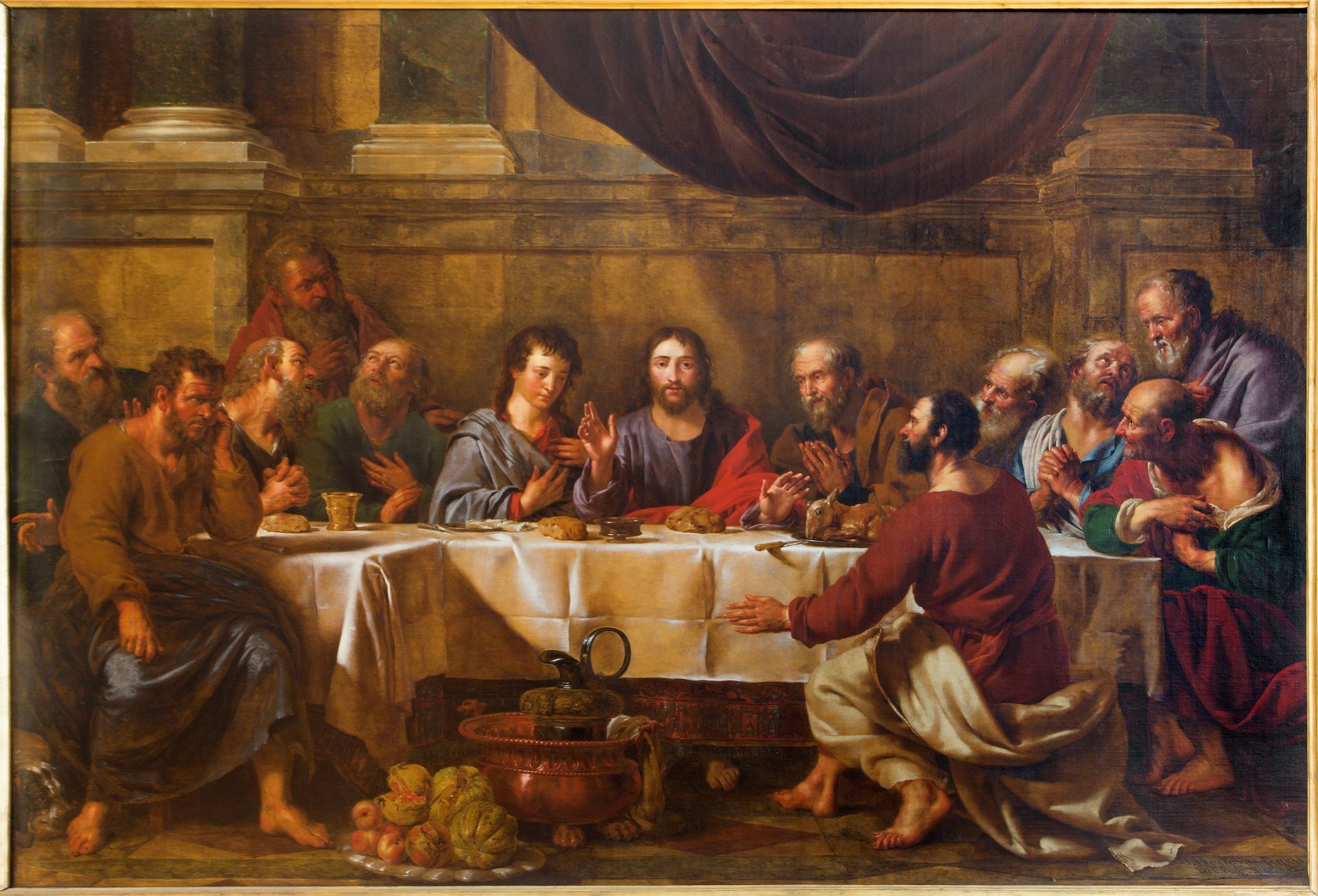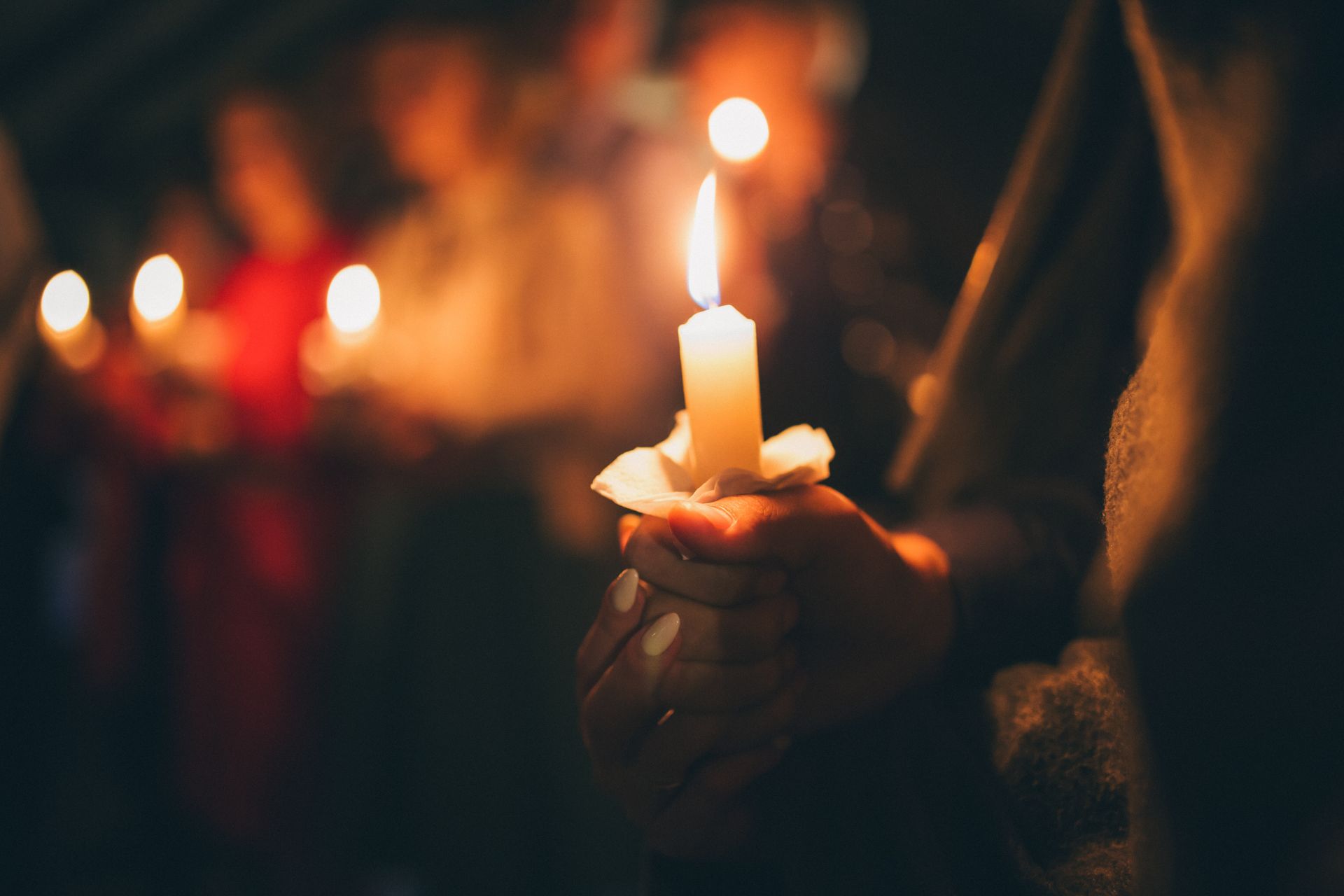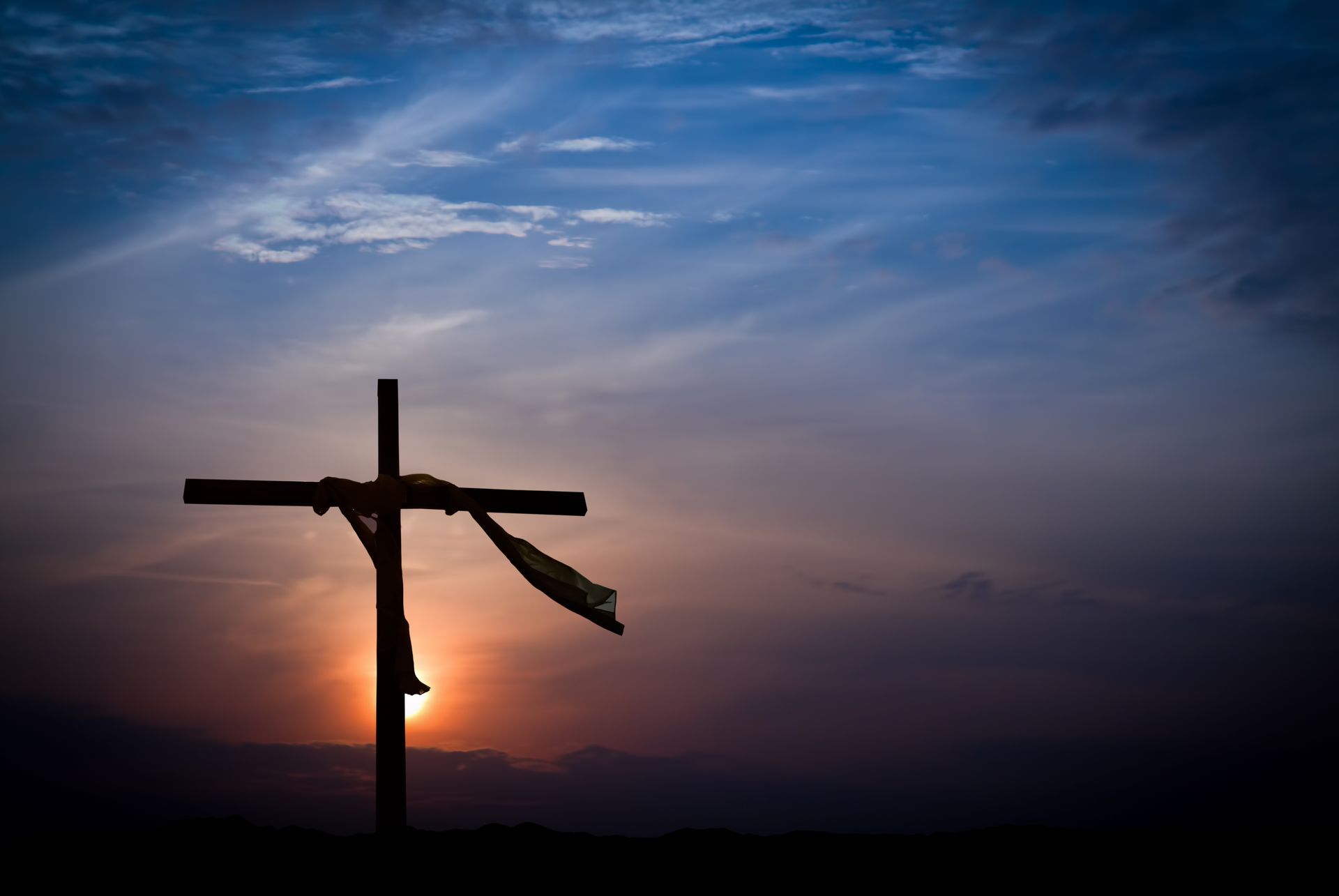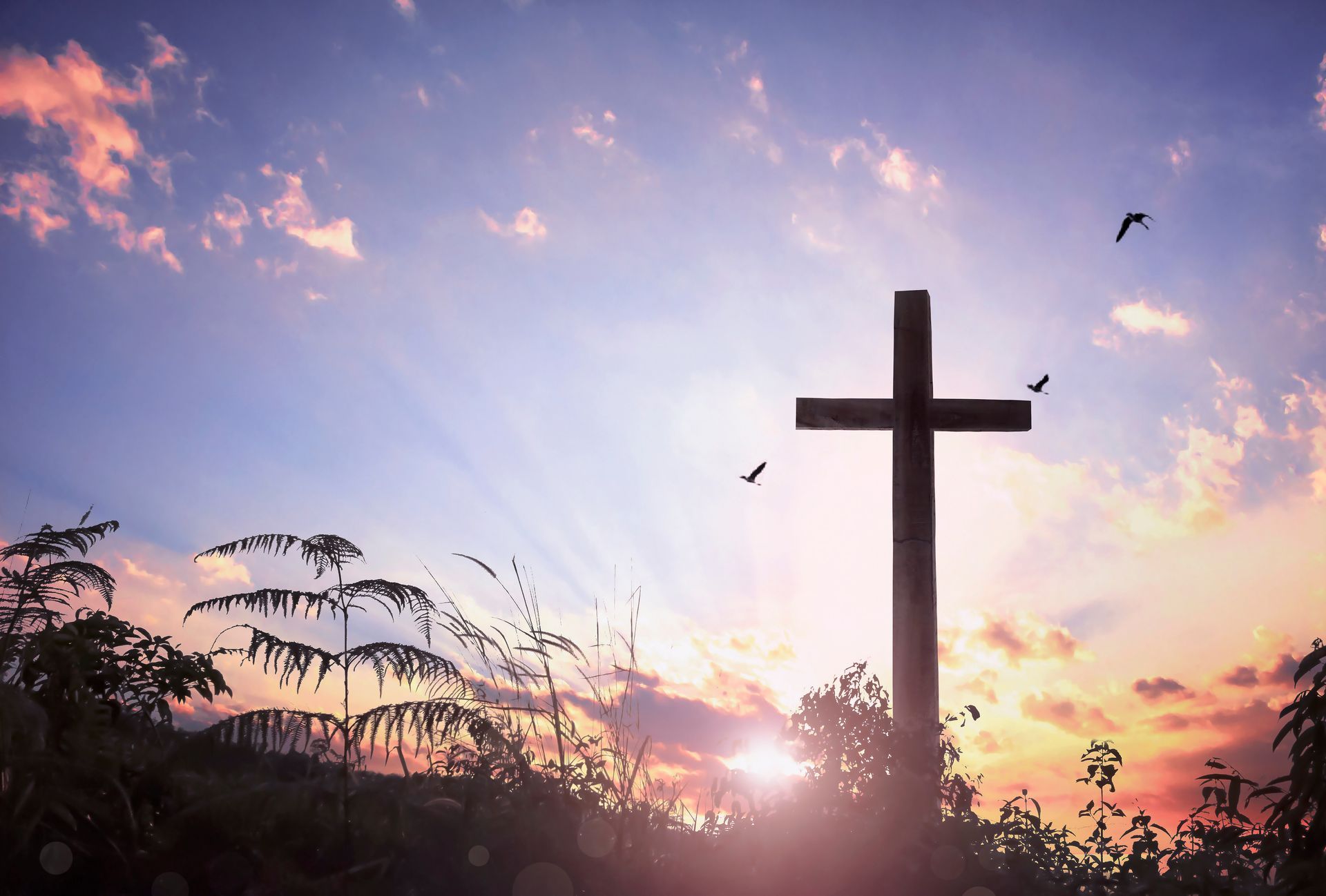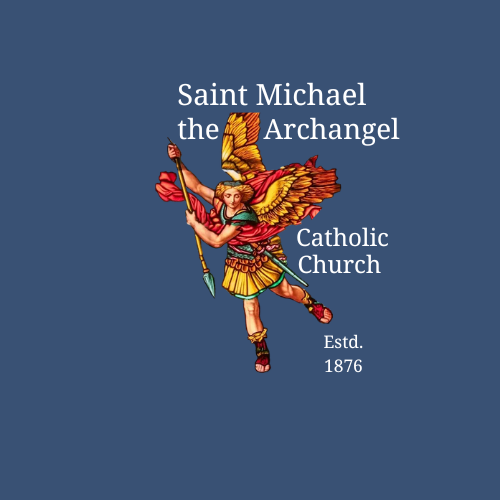Lent
Then Jesus was led by the Spirit into the desert to be tempted by the devil.
He fasted for forty days and forty nights...
Matthew 4: 1-2
The Season of Lent is February 18th through April 1st, 2026 for this Liturgical Year.
What is Lent?
The season of Lent is a Catholic Liturgical Season that is the forty days before Easter consisting of Fasting, Prayer, Almsgiving beginning on
Ash Wednesday and concluding at sundown on Holy Thursday. Lent ends when the evening Mass of the Lord’s Supper on Holy Thursday begins, because the Mass of the Lord’s Supper ushers in the
Sacred Paschal Triduum, a Liturgical Season in its own right.
The word Lent derives from the Middle English word "lenten", meaning springtime – the time of lengthening days. In almost all other languages, Lent’s name is a derivative of the Latin term "quadragesima" or “the forty days.”
According to the General Norms for the Liturgical Year and the Calendar, “Lent is a preparation for the celebration of Easter. For the Lenten liturgy disposes both catechumens and the faithful to celebrate the paschal mystery: catechumens (candidates for Baptism), through the several stages of Christian initiation; the faithful through reminders of their own baptism and through penitential practices” (General Norms 27).
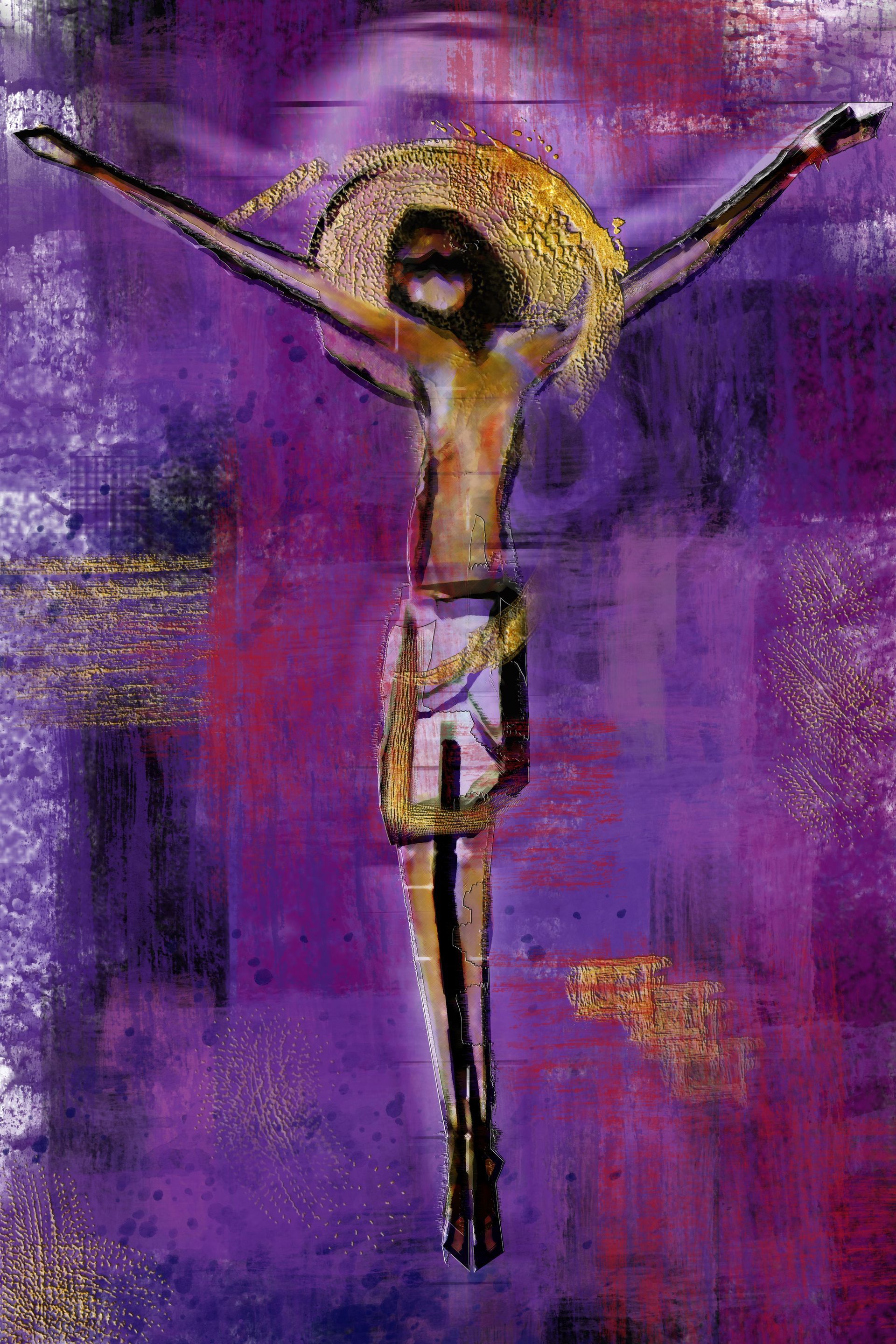
Get the United States Conference of Catholic Bishops (USCCB) Daily Inspiration Calendar for your Lenten Journey.
What is the first day of Lent?
Ash Wednesday is the start of the Season of Lent.
Ash Wednesday takes place 46 days before Easter Sunday, and is chiefly observed by Catholics, although many other Christians observe it too.
Ash Wednesday comes from the ancient Jewish tradition of Penance and Fasting. The practice includes the wearing of ashes on the head.
Jesus came to Galilee proclaiming the gospel of God: “This is the time of fulfillment. The kingdom of God is at hand.
Repent, and believe in the gospel.”
Mark 1: 15
Why is Lent 40 Days Long?
The 40 days of Lent, which precedes Easter is based on two Biblical accounts: the 40 years of wilderness wandering by the Israelites and our Lord's 40 days in the desert/wilderness at which point He was tempted by Satan.
Each year the Church observes Lent, where we, like Israel and our Lord, are tested. We participate in abstinence, times of fasting, confession and acts of mercy to strengthen our faith and devotional disciplines. The goal of every Christian is to leave Lent a stronger and more vital person of faith than when we entered.
Although the number of days from Ash Wednesday through Holy Saturday add up to 46 days, we observe the season as the 40 days of Lent. Some may feel it would be more accurate to refer to it as the "forty day fast within Lent."
While the Sundays during Lent are certainly a part of the season, they are not prescribed days of fast and abstinence.
-Catholic.org
What do we learn from the temptations of Jesus in the desert?
The temptations of Jesus in the desert recapitulate the temptation of Adam in Paradise and the temptations of Israel in the desert. Satan tempts Jesus in regard to his obedience to the mission given him by the Father. Christ, the new Adam, resists and his victory proclaims that of his Passion which is the supreme obedience of his filial love.
The Church unites herself to this mystery in a special way in the Liturgical Season of Lent.
Why is Baptism so important in our Lenten understanding?
The key to understanding the meaning of Lent is simple: Baptism.
Preparation for Baptism and for renewing baptismal commitment lies at the heart of the season. Since the Second Vatican Council, the Church has reemphasized the baptismal character of Lent, especially through the restoration of the Catechumenate and its Lenten rituals. Our challenge today is to renew our understanding of this important season of the Church year and to see how we can integrate our personal practices into this renewed perspective.
Lent as a 40-day season developed in the fourth century from three merging sources.
- The first was the ancient paschal fast that began as a two-day observance before Easter, but was gradually lengthened to 40 days.
- The second was the catechumenate as a process of preparation for Baptism, including an intense period of preparation for the Sacraments of Initiation to be celebrated at Easter.
- The third was the Order of Penitents, which was modeled on the catechumenate and sought a second conversion for those who had fallen back into serious sin after Baptism. As the catechumens (candidates for Baptism) entered their final period of preparation for Baptism, the penitents and the rest of the community accompanied them on their journey and prepared to renew their baptismal vows at Easter.
-Catholic.org
Lent: A Time to Prepare our Hearts...A Time of Renewal
Prayer, Fasting and Almsgiving are the three traditional pillars of the Lenten observance. The key to renewed appropriation of these practices is to see their link to baptismal renewal.
Prayer

More time given to prayer during Lent should draw us closer to the Lord.
We might pray especially for the grace to live out our baptismal promises more fully.
We might pray for the elect who will be baptized at Easter and support their conversion journey by our prayer.
We might pray for all those who will celebrate the sacrament of reconciliation with us during Lent that they will be truly renewed in their baptismal commitment.
Fasting
Fasting is one of the most ancient practices linked to Lent. In fact, the paschal fast predates Lent as we know it. The early Church fasted intensely for two days before the celebration of the Easter Vigil. This fast was later extended and became a 40-day period of fasting leading up to Easter.
Vatican II called us to renew the observance of the ancient paschal fast: "...let the paschal fast be kept sacred. Let it be celebrated everywhere on Good Friday and, where possible, prolonged throughout Holy Saturday, so that the joys of the Sunday of the Resurrection may be attained with uplifted and clear mind" (Liturgy,#110).
Fasting is more than a means of developing self-control. It is often an aid to prayer, as the pangs of hunger remind us of our hunger for God. The first reading on the Friday after Ash Wednesday points out another important dimension of fasting.
The prophet Isaiah insists that fasting without changing our behavior is not pleasing to God...
"This, rather, is the fasting that I wish: releasing those bound unjustly, untying the thongs of the yoke; setting free the oppressed, breaking every yoke; sharing your bread with the hungry, sheltering the oppressed and the homeless; clothing the naked when you see them, and not turning your back on your own"
(Isaiah 58:6-7).
Fasting should be linked to our concern for those who are forced to fast by their poverty, those who suffer from the injustices of our economic and political structures, those who
are in need for any reason.
Thus fasting, too, is linked to living out our baptismal promises. By our Baptism, we are charged with the responsibility of showing Christ's love to the world, especially to those in need.
Fasting can help us realize the suffering that so many people in our world experience every day, and it should lead us to greater efforts to alleviate that suffering.
Abstaining from meat traditionally also linked us to the poor, who could seldom afford meat for their meals. It can do the same today if we remember the purpose of abstinence and embrace it as a spiritual link to those whose diets are sparse and simple. That should be the goal we set for ourselves--a sparse and simple meal. Avoiding meat while eating lobster misses the whole point!
Guidelines for Fasting and Abstinence during Lent
Do we fast or abstain on Sundays during Lent?
No, because every Sunday we celebrate the Resurrection since Jesus rose on the first day of the Week. However, this does not necessarily mean we get to indulge in our additional penitential practices on Sundays.
A lot of people choose something to give up on their own during Lent. These practices are disciplinary and often more effective if they are continuous, including Sundays. These practices are not regulated by the Church, though, and left to an individual's conscience.
Almsgiving
It should be obvious at this point that Almsgiving, the third traditional pillar, is linked to our baptismal commitment in the same way.
It is a sign of our care for those in need and an expression of our gratitude for all that God has given to us.
Works of charity and the promotion of justice are integral elements of the Christian way of life we began when we were baptized.
Special Almsgiving at Saint Michael Parish
Fr. Tony Didongo, SMA is the priest and manager of his parish and school in Madina Accra, Ghana.
Fr. Tony has visited us throughout the years and has helped us celebrate Mass during the summers at Saint Michael.
Establishing and growing the Saint Peter Claver International School continues to be his mission for the children of Madina Accra, Ghana. The catholic school is celebrating 5 years since the time that Fr. Tony had first established it..
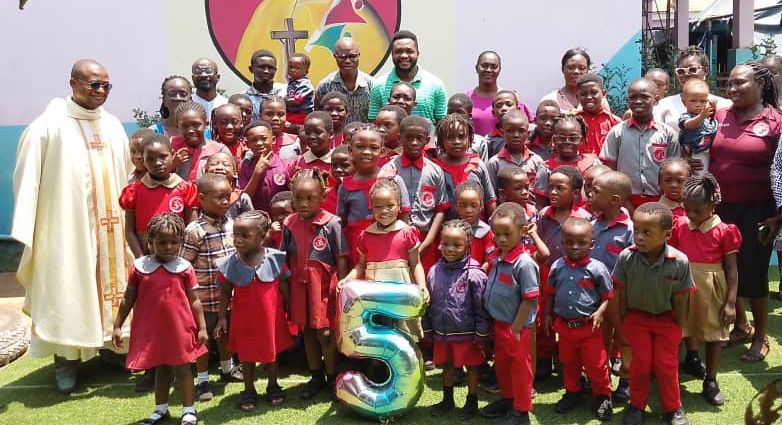

As Saint Michael Parish had done last year during Lent with great success, we will again have rice bowls for Fr. Tony's mission.
Pick up a “rice bowl” box at the entrances of the church and start a daily routine of putting aside offerings to help support the catholic mission of Fr. Tony.
Bring the box back to church after Easter, and see how our gifts are multiplied to make a dynamic impact on the lives of these catholic families and children!
What are some ways our family can Worship and Pray together during Lent?
The Season of Lent is a special time to remember God’s love for us, and the ultimate Sacrifice of His Son, Jesus Christ.
It is a time to prepare for the Passion, Death, and Resurrection of Jesus Christ that we will experience during the Sacred Paschal Triduum and Easter Sunday.
Attending and participating at the Mass is always necessary in the development of our families' spiritual growth in Christ, but practicing our faith in our lives at home, everyday enforces our . Here are some additional ways to worship and pray.
Praying Together
Pray together as a family each day.
- Attending and Participating at Mass together, explaining the importance of pastoral/communal worshiping of Christ with the People of God.
- Read a story from Sacred Scripture.
- Take turns choosing/leading prayers or write a family prayer together.
- Ask everyone what their special prayer intention might be or have everyone choose a person they came across that day who needs extra prayer.
- Say a nighttime prayer before going to bed, reflecting on your day.
- Teach your children about the Rosary and how Mary is a role model for us.
- Pray the Rosary together, with a different family member leading each decade.
Fasting: Focus on God
Talk about the purpose of fasting (sacrifice) and what family members might choose, remembering that its purpose is to bring you closer to Jesus.
- A fast from screens and social media for a day or week, and spend family time together – praying, talking, learning, playing, strengthening your relationships.
- Talk about why Catholics fast on Ash Wednesday, Good Friday and abstain from meat on Fridays.
Almsgiving and Sevice
- Contribute to our food pantries and goods to area shelters
- Give prayfully to our Parish and Diocese weekly offerings, special collections and campaigns.
- Become a steward by volunteering your time and talents to help others in our Parish and our communtiy.
- Watch the bulletin and parish website for other giving and service opportunities!
The Way of the Cross
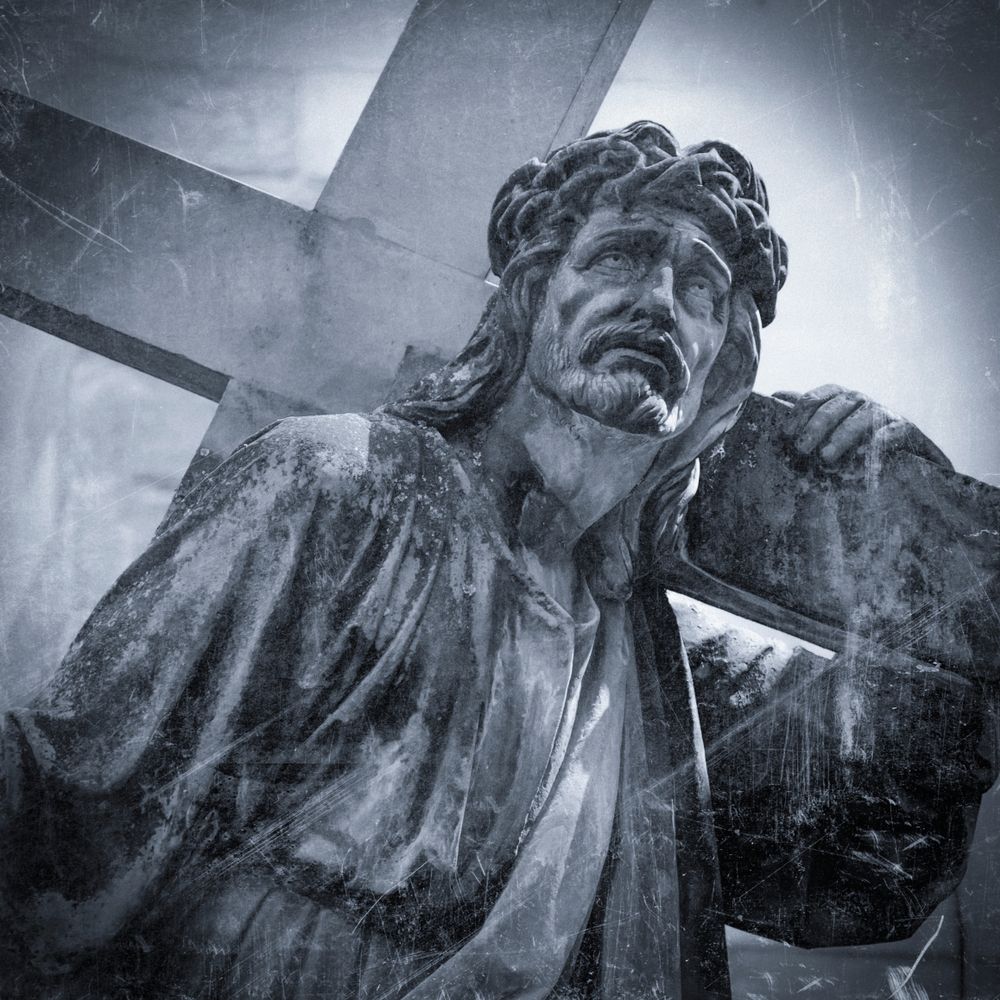
Located in each Catholic church are 14 stations which commemorate Jesus Christ's last day on earth as a man.
Good Friday of the Lord's Passion is the actual day that these events of Jesus Christ's final hours occurred.
We welcome you to privately take your "pilgrimage" with the Stations of the Cross in the Church. Also, view the bulletin for the dates and times for experiencing this with other participants during the communal/ public Stations of the Cross held at Saint Michael Parish during Lent or Holy Week.
We prepare during Lent for the Passion, Death, and Resurrection of Jesus Christ that we will experience during the Sacred Paschal Triduum and Easter Sunday...
SACRED PASCHAL TRIDUUM
The Easter Triduum begins with the evening Mass of the Lord’s Supper on Holy Thursday, reaches its high point in the Easter Vigil, and closes with Evening Prayer on Easter Sunday.



